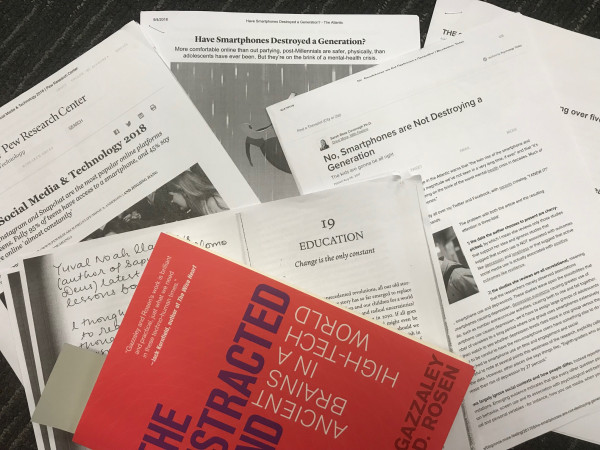
You are logged in as
Logout
You are logged in as
Logout
Technology – it’s a topic we talk about a lot and is highly relevant to both parents and educators. Increasingly, we read thought provoking articles focusing on the impact that technology addiction is having on distracting the adolescent brain, deteriorating mental health, and increasing social isolation. At St Andrew’s College we think it important that we see the whole picture.
Is the digital world bad for the teenage brain?
Neurobiologist, Dr John Medina specialises on teen brain development. The question, “Is the digital world bad for the teenage brain?” is one that predominates his lectures. Medina stresses the answer is not straight forward. Firstly, what is meant by the digital world? Laptop? iPhone? Snapchat? Xbox? Instagram? And secondly, what aspect of brain development are we interested in? Attention spans? Social Interactions? Mental health? Creativity?

Like any other question psychologists can think to ask about human behaviour, screen use and its association with psychological well-being varies based on a multitude of contextual and personal variables.
Says Medina, We don’t have the answers to these questions and most of these variables haven’t been investigated in carefully designed randomised trials. We need more research.
One thing we know for sure – there has been exponential growth in adolescents use of technology. Research from the Pew Research Centre has tracked changes in adolescent internet use. Smartphones are ubiquitous. In 2018, 95% of teens (aged 13–17) have access to a smartphone. And 72% of these teens are active on Instagram and Snapchat. A growing share of teens now describe their internet usage as online on a near constant basis. Research has found that adolescents are spending an average of 8.5 hours per day on their screens.

There is no doubt that we are witnessing a digital revolution. And this revolution is happening faster than any other innovation that has occurred through human history.
At St Andrew’s we see it as important to follow research as it emerges. We need to understand the advantages and disadvantages of technology, so our students can harness the benefits and mitigate the risks associated with a rapidly changing world.

So? What are the advantages with increased technology?

Increased access to information provides opportunities for more personalised teaching and learning. Students can extend their learning by researching what they are personally interested in and motivated by. Programmes like Education Perfect allow students to learn and progress at their own pace, and seek timely feedback.


Interestingly, there is little, to no conclusive evidence analysing the causal relationship between technology and educational achievement. In 2011 Tamim and Bernard reflected on 40 years of research by conducting a meta-analysis on 1,055 research studies related to the impact computer technology has on student achievement. The results of this meta-analysis were inconclusive due to the wide array of variables that can impact the findings.
The researchers' conclusion reflects St Andrew’s College strong perspective; technology should always serve the pedagogical approaches and teacher practices that we know impact student achievement (teachers matter). Technology is a wonderful tool, but we know that it is teacher effectiveness that has the most powerful impact on effect sizes and student achievement.

What are the disadvantages?
Jean Twenge is a professor of psychology who has specialised in analysing the generational patterns of adolescents. Her article Have smartphones destroyed a generation? was one of the most read Atlantic articles in 2018. In it, she indicates that the arrival of the smartphone has radically changed every aspect of teenagers’ lives, from the nature of their social interactions to their mental health.




There is no question that technology will continue to accelerate faster than our ability to anticipate and deal with the consequences. St Andrew’s are committed to staying up to date with the discussion and research. My next blog post will focus on strategies at school and home that have been proven to be effective for managing technology effectively.
Cavanagh, S.R. “No, Smartphones are not destroying a generation.” in Psychology Today online (August, 2017)
Gazzaley, A., & Rosen, L. (2016). The Distracted Mind: ancient brains in a high-tech world. The MIT Press, London, England.
Harari, Y. N. (2018). 21 Lessons for the 21st Century. Vintage Publishing. London, U.K.
Hooper V. A. & Herath D. C., (2014). ‘Is Google making us stupid? The impact of the internet on reading behaviour’, Proceedings of 27th Bled eConference, edited by Andreja Pucihar, Christer Carlsson, Roger Bons, Roger Clarke, Mirjana Kljajic Bortnar (Slovenia, University of Maribor), pp. 51-62.
Karadaras, N. (2016). Glow Kids: How Screen Addiction is Hijacking Our Kids- and How to Break the Trance. St Martin’s Press, London.
Tamim, R.M., Bernard, R.M., Borokhovski, E., Abrami, P.C. & Schmid, R.F. (2011). What Forty Years of Research Says about the Impact of Technology on Learning: A Second-Order Meta-Analysis and Validation Study. Review of Educational Research, 81(1), 4-28.
Livingstone, S. (2018) iGen: why today’s super-connected kids are growing up less rebellious, more tolerant, less happy – and completely unprepared for adulthood, Journal of Children and Media, 12:1, 118-123
Medina, J. (2018) Attack of the Teenage Brain! Understanding and supporting the weird and wonderful teenage learner. ASCD. Alexandria.
Thompson, C. (2013). Smarter than you think: How Tech is changing our minds for the better. The Penguin Press, New York.
Twenge, J. “Have Smartphones Destroyed a Generation?” in The Atlantic Magazine (Online, 2017)
Kerry Larby, Head of Well-being and Positive Education